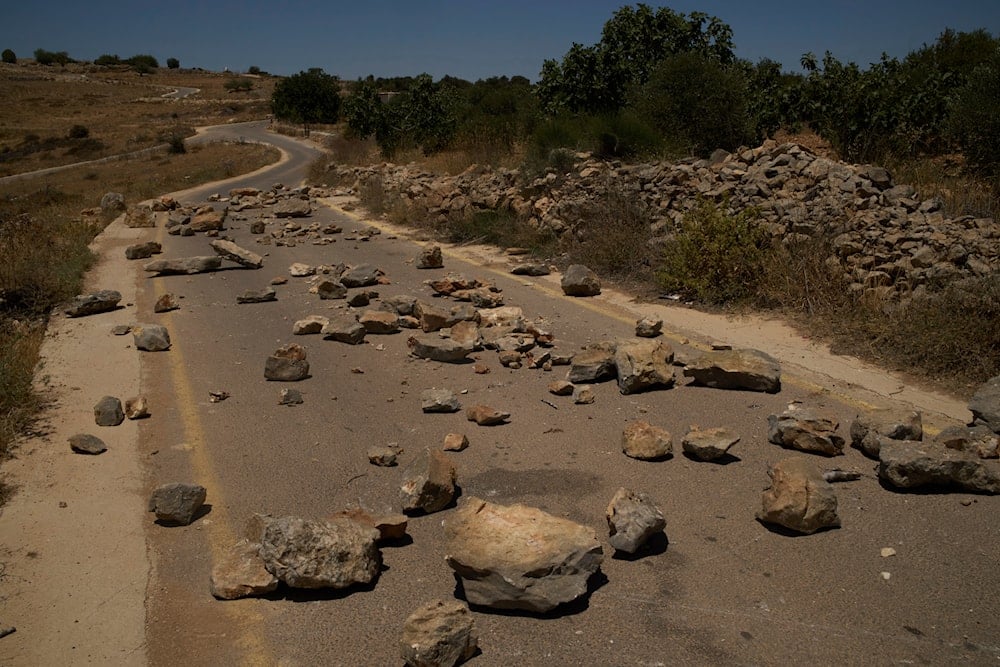Rising settler violence in West Bank sparks Palestinian uprising calls
Settler violence across the West Bank escalates under Israeli military protection, as Palestinian factions call for mass resistance and international accountability.
-

Rocks were scattered across a roadblock access for Palestinians in the West Bank village of Sinjil on July 9, 2025, following an attack by Israeli settlers last week, according to residents. (AP Photo/Leo Correa)
Settler attacks are escalating across the occupied West Bank as part of the Israeli occupation’s ongoing efforts to annex Palestinian territory. These incursions are taking place under direct military protection and with full political backing from the Israeli government, according to rights groups and local sources.
On Saturday, settler bulldozers resumed land leveling operations in the town of Raba, southeast of Jenin, to expand control over the surrounding area. Meanwhile, in the northern Jordan Valley, settlers transported mobile homes to the Qa'oun Plain near Bardala, moves widely seen as preparation for a new illegal outpost.
Additionally, settlers pitched tents on the western outskirts of Deir Istiya, a village already under intense pressure due to nearby settlements, in Salfit Governorate. Local sources report that nine settlements and two grazing outposts have already been established in the area, posing an existential threat to Palestinian residents.
In another alarming development, settlers stormed the village of Shalla al-Auja, northeast of Areeha (Jericho), and unleashed livestock into residential neighborhoods and farmlands, damaging pastures and crops. The Al-Baydar Organization for the Defense of Bedouin Rights confirmed the incident and warned that such daily settler incursions are systematically displacing Palestinian communities.
Hassan Mleihat, coordinator for Al-Baydar, stated that the attacks are taking place “under the protection of the Israeli military,” leaving communities vulnerable and without effective protection mechanisms. These actions, he noted, are fueling instability and fear in already isolated and marginalized regions.
The targeted areas, particularly in the Jordan Valley and northern West Bank, are seen as strategic to the occupation’s broader annexation policy, designed to encircle Palestinian towns, seize farmland, and fracture territorial contiguity.
Calls for Resistance mobilization
In response to the violence, Palestinian factions have called for mass mobilization and popular resistance. Hamas urged the reactivation of local protection committees and described the wave of settler assaults as "crimes committed under direct military cover."
Moreover, Senior Hamas official Mahmoud Mardawi condemned the daily raids by what he termed "settler gangs," saying they reflect "the true face of a criminal entity that knows only destruction and death." He also criticized the Palestinian Authority for its continued security coordination with the occupation, calling it a form of complicity.
Mardawi called for "comprehensive resistance" as a national response to stop "Israel’s" annexation agenda and systemic displacement.
Fatah condemns Sinjil killings, demands US accountability
Fatah also condemned recent settler attacks, accusing armed settler militias of carrying out a massacre in the town of Sinjil, northeast of Ramallah. The assault killed two young men, Saif al-Din Musallat, a Palestinian-American citizen, and Mohammad al-Shalabi, and left dozens injured.
The movement said the killings are part of an organized campaign of ethnic cleansing orchestrated by "Israel’s" far-right government and implemented by settler militias under military cover, calling for the prosecution of Israeli officials and militias in international courts, and demanding that the US government take responsibility for the death of its citizens.
Annexation agenda and ethnic cleansing accusations
Palestinian factions and rights groups describe the uptick in settler violence as part of a coordinated annexation strategy backed by the Israeli government. The expansion of illegal settlements and settler-only roads, combined with the daily terrorizing of Palestinian communities, fits into what many now describe as a policy of forced displacement and de facto ethnic cleansing.
With the West Bank increasingly destabilized and international outrage mounting, calls are growing louder for foreign governments and international legal bodies to take action against settler militias and the Israeli officials enabling them.

 4 Min Read
4 Min Read










